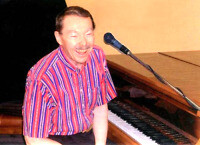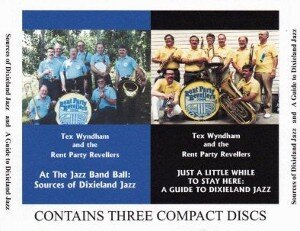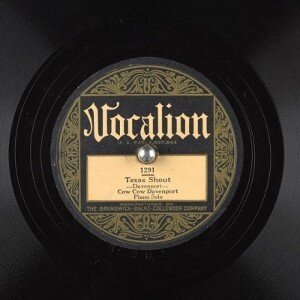 Set forth below is the fifty-seventh “Texas Shout” column. The concluding installment of a two-part essay, it first appeared in the December 1994 issue of the West Coast Rag.now known as The Syncopated Times.
Set forth below is the fifty-seventh “Texas Shout” column. The concluding installment of a two-part essay, it first appeared in the December 1994 issue of the West Coast Rag.now known as The Syncopated Times.
The text has not been updated. As the first part ended, I was completing a discussion of the oft-repeated claim, of which I am highly skeptical, that Fats Waller actually composed certain standard songs which, on the published song sheets, are credited to other composers.
How do such stories get started? I have a couple of ideas thereon which I’ll share with you after I vent one other peeve of mine regarding Fats Waller legends.
It is an article of faith among some Waller commentators that Fats was forced by record producers to play worthless pop ditties of the day and that his humorous vocalizing and spoken asides on his records were a way of protesting such treatment. The unspoken assumption seems to be that, if Fats had been left alone to do what he wanted to do, his recordings would have been somehow better, based on stronger material, and more “serious” (thereby being more worthy of attention by a “serious” jazz fan). To me, this kind of thinking flies in the face of what we know about Fats personally, and also of his overall recorded legacy.
To begin with, by all accounts, Fats was an ebullient, irrepressible and irresponsible personality, one who lived entirely for the moment, never planned ahead, loved to kid, and kept everyone around him in good spirits. His recordings are consistent with that view, as he seems unable to restrain himself from joviality no matter what he’s playing, be it one of his immortal standards or one of those so-called “worthless” ditties.
We all know such people – good-natured, easy-going folks who never seem to take things seriously and, with their spontaneous wit, constantly light up the room. Naturally, jazz has its share of them, and Waller was one of them. It’s as simple as that.
Further, from what we know of Fats’ appearances where he seems to have had a freer hand in selecting repertoire – such as air checks, or piano solo sessions without his hot little backup group– Fats tended to gravitate to the same handful of numbers, often his own works like “Honeysuckle Rose,” “Ain’t Misbehavin’,” “I’m Crazy ‘Bout My Baby” and “Blue, Turning Grey Over You.” This picture is consistent with that of many older-style jazz players who have certain tunes with which they feel particularly comfortable and who play (and record) those numbers over and over again, sometimes with little variation in the solos.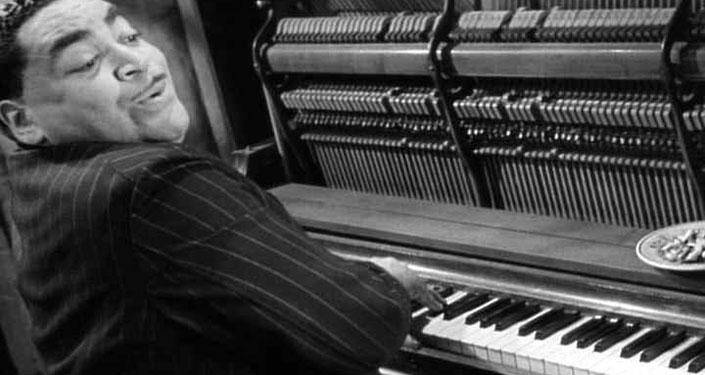
Fats was not a student of pop music the way some of today’s older-style jazzmen/women are, compiling lists of obscure gems that he was dying to get on record. He entered the studio with little or no advance planning (e.g., Eddie Condon‘s famous story about Waller’s “The Minor Drag” date).
Had Fats been left to his own devices, we’d probably be left with hundreds of Waller records re-waxing about twenty tunes instead of the rich and varied discography we have. And he still would have been kidding around. I know which choice I prefer.
Further, as to those “worthless” tunes, Waller was a nationally famous recording artist for RCA-Victor, one of the biggest labels in the country, a company that could and did command access to the latest and best from the songwriting industry. Moreover, we’re talking about the 1930s, the time when the craft of writing popular music probably reached its all-time peak.
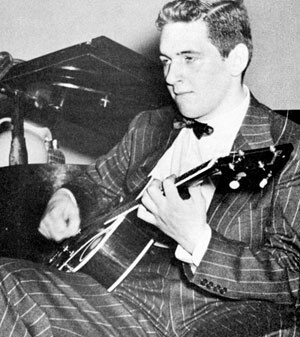
Many of the selections recorded by Fats may not have gone on to become standards, and they may have had the type of sentimental lyric that causes discomfort in certain areas of jazz criticism, but they contain plenty of musical red meat. Indeed, Fats’ recordings have provided a gold mine for jazzmen looking for high-quality but underplayed material. When someone today comes up with a new rendition of something Fats did back then, he/she’s usually praised for doing so, not castigated for resurrecting “worthless” titles. For that matter, when guitarist Marty Grosz, probably our foremost keeper of the overall Waller ambiance in his bands, inserts some of his own very funny, dry wit into the rides, everybody (rightly) gets a big bang out of it. They don’t go around wringing their hands because poor Marty has to take out his frustrations on the dreck he’s been given to play.
We’ve headed in several directions today, so let’s take time out to recapitulate. We started this essay noting that many jazz players don’t know or care who wrote the tunes they play. Having concluded that discussion, we found that it led into some idle thoughts regarding misattribution of composer credits, a topic clouded somewhat by rumors that famous white composers stole from Black stride pianists.
Then, by stream-of-consciousness thinking generally forgivable when employed by persons of my advanced age, we wandered into another area of rumors about a Black stride pianist, one who reportedly was laughing to keep from crying. Many of these rumors seem like nonsense from a common-sense viewpoint, but they keep getting repeated in the literature.
What’s going on here? I’ve said before in these pages that there is a lot of material written about jazz that just isn’t so. Part of these fairy tales result from the hidden agendas of some jazz commentators. Three such viewpoints regularly recur in the literature, and I see them at work in the matters discussed above.
First, there are those who regard jazz as a serious matter. They are most comfortable with lyrics that talk of no-good lovers, broke-and-hungry people and the like. The higher the blues content in the music, the more they like it.
Conversely, such folks are discomfited by anyone who seems to be having fun with our music. They are quick to say that jazz played by a band that wears eye-catching uniforms must necessarily be trivial; that songs with upbeat lyrics about, say, flappers and sheiks, or sentimental romance, lack the proper depth; and that any device which seems to add humor to a performance, no matter how well it might enhance the emotional pitch of the ride, is corny or Spike Jones-type irrelevancy. To illustrate: If you play an obscure jazz instrumental for one of these types, and preface it with the statement that the tune is titled “Gritty Hawg Jowls,” they’ll leap to tell you how gutty, earthy and low-down it is. However, if you tell them instead that they’re about to hear a number called “Dimpled Kiddie Smiles,” and then play the same rendition, they’ll ask you to take it off before it ends, claiming it’s the fluffiest, most trivial thing they’ve ever heard.
When Fats starts clowning around on his titles, even when the jokes are truly witty and contribute to the general hilarity and heat of his wonderful little combo, our doomsayer critics can’t laugh along with the rest of us. They have to find some other reason supporting the humor. Hence, we hear about poor Fats, suffering for his art, taking out his frustrations on the material.
Of course, such a viewpoint refuses to consider jazz on its artistic merits. Jazz, like any other valid art form, is capable of expressing the full range of human emotion, from the most euphoric and cheerful, through the most tender and romantic, to the most despondent. There is no reason why a performance which concentrates on the brighter end of that spectrum has any less claim on our attention than the reverse, provided the results are done with originality, heat, and swing – always a hallmark of any Waller recording.
Second, there are those who really want to keep the music for themselves. They complain that jazz musicians as a rule don’t get rich and famous, but when one does, they can’t handle it. They rapidly assert that the artist has “sold out,” “gone commercial” or the like.
To those folks, it is inconceivable that the jazz community, once in a while, could produce a Fats Waller or a Louis Armstrong, someone with immense jazz talent who also had the type of stage personality that endeared him to the public in general, one who could reach the people without compromising his artistic integrity. So when Fats tosses off one of his hilarious asides, or Louis breaks into that big-eyed grimace during a vocal, such actions can’t be interpreted to be part of a natural style, but must be seen as demeaning condescension to the public’s inevitably bad taste.
I don’t buy that view, either. If all a jazz musician had to do to become rich and famous was to “sell out,” there would be plenty of Dixieland musicians over the years, just barely scraping by, who would be rushing to do so at the first opportunity.
As I have said before in these pages (see “Texas Shout” for August 1990), entertainment for its own sake is a perfectly valid objective for a jazz band. The trick is to find a way to entertain while still playing the kind of music you prefer, an ability with which Fats and Louis, for example, seem to me to have been naturally gifted.
Thirdly, and finally, while one brings up racial topics very gingerly these days, it is common knowledge that there has always been a strong streak in jazz criticism of Crow Jim (i.e., prejudice in favor of Blacks). Entire books have been written which essentially dismiss all white jazzmen/women out of hand, usually taking the view that even the best of them are pale ripoffs of Black performers.
Part and parcel of this school is the notion that virtually every Black performer has to be seen as some type of victim, no matter how famous or how successful he/she became. Those who subscribe to this view are quick to believe that, for example, well-known white composers really got to the top by stealing themes from the Wallers and James P.s of the world.
Well, being a Black jazz musician never has been a bed of roses, particularly in the twenties. Black artists were, in fact, treated inexcusably with regularity by unscrupulous whites who were in a position to do so. For example, on several occasions, I remember listening to Eubie Blake tell about working conditions for Black vaudevillians so cruel and harsh that our hearts bled to think of them.
In short, there are plenty of well-documented shameful instances of racial discrimination in our music’s history without going around looking for more, or finding reasons to make up some without any sort of hard evidence. Did Fats have to face the indignities of bigotry? Without a doubt. However, that conclusion doesn’t make me inclined to believe that he, and not the credited composers, actually wrote all, many, or even any of the tunes with which Fats is most closely associated.
Those three filters for viewing jazz – that it must be “serious,” that it cannot be commercially popular without being suspect quality-wise, and that discrimination against Black musicians is a major part of the answer to nearly every meaningful question related to our music – have been thrown up time and again by those who would like to dissuade you from listening to certain musicians, Dixieland styles or specific performances. Be aware of these theories, give them the value they deserve, but don’t be seduced by them.
There is no general proposition about jazz that will tell you anything reliable about whether a given musician, band or performance will be worth hearing. Listen for yourself to the jazz with open ears and an open mind. Then decide on the merits of the music, not on pop sociology.
And if Fats, Marty Grosz, or The Firehouse Five Plus Two, or anyone else, cracks a joke on a recording, I have a bit of advice for you: it’s perfectly O.K. to laugh and still conclude that the overall ride was a great, hot, swinging jazz rendition.
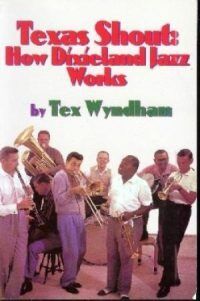 Want to read ahead? Buy the book!
Want to read ahead? Buy the book!
The full run of “Texas Shout” has been collected into a lavishly illustrated trade paperback entitled Texas Shout: How Dixieland Jazz Works. This book is available @ $20.00 plus $2.95 shipping from Tex Wyndham, On request, Tex will autograph the book and add a personalized note (be sure to tell him to whom the note should be addressed).
Tex Wyndham’s 3 CD Guide to Dixieland with music and commentary is available for $20 plus $2.95 shipping. The separate CD, A History of Ragtime: Tex Wyndham Live At Santa Rosa, is available for $13.00 plus $2.00 shipping. On request, Tex will autograph the inner sleeve and add a personalized note (be sure to tell him to whom the note should be addressed).
Send payment to Tex Wyndham, P.O. Box 831, Mendenhall, PA 19357, Phone (610) 388-6330.
Note: All links, pictures, videos or graphics accompanying the Shouts were added at the discretion of the Syncopated Times editorial staff. They did not accompany the original columns and do not necessarily reflect the opinion of Tex Wyndham.
From roughly 1970-2010, Tex Wyndham was: (1) one of the best-known revivalist Dixieland jazz musicians in the US, as cornetist, pianist and bandleader, (2) one of the best-known ragtime pianists in the US, and (3) one of the most respected critics in the US of Dixieland jazz, ragtime, and related music. He is the only person about whom all three of those statements can be made.

